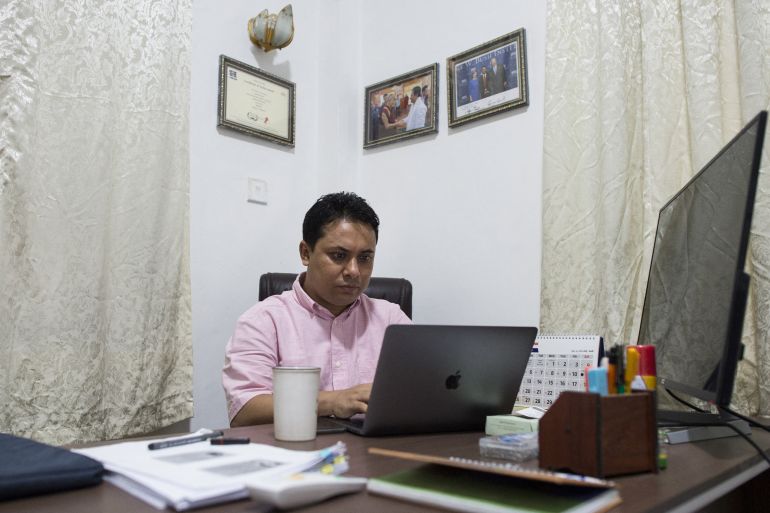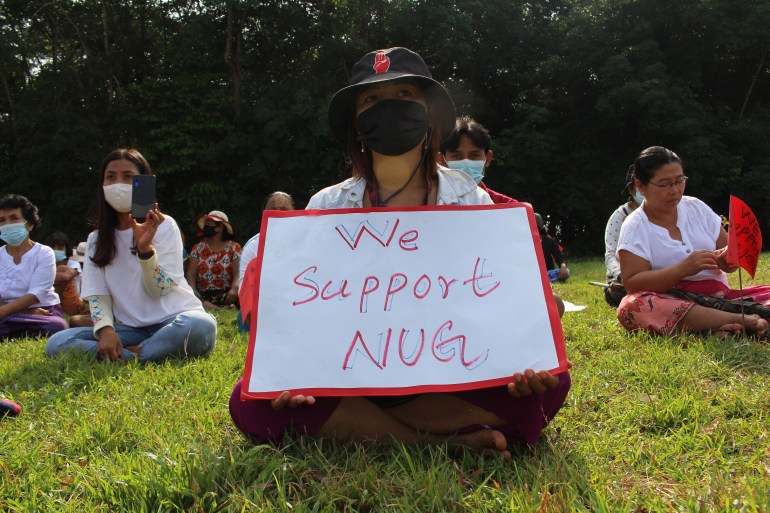Q&A: NUG’s first Rohingya minister says Myanmar in ‘unified revolution’
Aung Kyaw Moe says the civilian government working to remove the military has a vision of a more inclusive Myanmar.

It has been more than two years since the Myanmar military staged a coup to overthrow the democratically elected National League for Democracy and jail civilian leader Aung San Suu Kyi.
The power grab in February 2021 has only pushed the country deeper into crisis, with the Armed Conflict Location and Event Data Project ranking Myanmar as the top conflict area in 2023 and home to the highest number of non-state armed groups.
Keep reading
list of 4 itemsDozens killed and injured in military attack on Myanmar refugee camp
UK, Canada, Taiwan criticise Myanmar as generals unleash ‘corrective purge’
‘Baby steps’ for ASEAN as it wraps up first-ever joint military drills
The National Unity Government (NUG) – established by elected ministers who were removed in the coup as well as supporters of democracy – continues to press on with governmental business and to build international support, largely from outside the nation’s borders.
Significantly, the NUG has implemented a cultural and political shift within its ranks, first appointing an openly gay minister Aung Myo Min into the human rights cabinet and a Rohingya, Aung Kyaw Moe, as their deputy.
The mostly Muslim Rohingya have long been excluded from government positions in Myanmar; in 1962, laws were enacted to prevent Rohingya from holding office, and in 1982, the Rohingya were barred from even being citizens of a country they have called home for hundreds of years.

In 2017, this prejudice spilled over into the expulsion of nearly a million Rohingya into neighbouring Bangladesh. Led by coup leader Senior General Min Aung Hlaing, the military crackdown garnered immense public support and was not condemned by Aung San Suu Kyi or her administration. Indeed she even travelled to The Hague to testify in support of Myanmar after the International Court of Justice began genocide proceedings.
As such, the appointment of a Rohingya as the NUG’s Deputy Human Rights Minister suggests a significant shift from the Bamar ethnic group’s domination of the former NLD and signals a willingness for the NUG to confront and repair its recent repressive history towards the Rohingya.
Al Jazeera spoke recently to Aung Kyaw Moe. The interview has been edited for length and clarity.
Al Jazeera: Given the repressive history of the Rohingya – including the 2017 genocide and exclusion from public and political life since 1982 – how significant is your appointment as Deputy Human Rights Minister with the National Unity Government?
Aung Kyaw Moe: The appointment of a Rohingya cabinet member is historic as Rohingya people have been excluded from holding political office since 1962.
Despite close to one million being expelled to neighbouring Bangladesh, the Rohingya remaining in Myanmar are one of the single largest ethnic and religious minorities in Myanmar with a politically representable population.
The Rohingya have always been a part of Myanmar, it is now, and it always will be. It is therefore vital that in this historic moment where the whole nation is fighting to end the dictatorship and shape the future of the nation, the Rohingya are included in those efforts both by function and numbers to contribute and be part of the nation’s political decision-making.
Al Jazeera: With nearly a million Rohingya in Bangladesh refugee camps, how does the NUG plan to tackle the issue of repatriation, not only of the people, but also of ancestral lands in Rakhine State?
Aung Kyaw Moe: In June 2021, the NUG released its policy paper on the Rohingya – the result of a series of consultations with key leaders.
The policy clearly states NUG’s position to tackle the issue of repatriation. The NUG is working toward the development of a comprehensive repatriation plan which will ensure a safe, voluntary and dignified repatriation of Rohingya; resettlement ensuring that Rohingya can go back to the place of origin in their ancestral lands in Rakhine State; and also, reintegration that will ensure the Rohingya are integrated with the larger society and able to live in a cohesive society.
The NUG will also abolish the 1982 citizenship law which excludes the Rohingya from citizenship, and any other local laws that can be used as tools to discriminate against the Rohingya.
Al Jazeera: The 2017 genocide against the Rohingya – led by coup leader Min Aung Hlaing – was widely supported by Myanmar people. What are the challenges of educating the broader Myanmar population about the situation for the Rohingya?
Aung Kyaw Moe: The Spring Revolution [the revolt against the coup] in Myanmar is a wake-up call to the broader Myanmar population to stand and act from a moral ground. Despite a very high cost from lives to livelihood that people are bearing every day, people in Myanmar came to the path of political consciousness where the military is no more able to use the religious card to divide and rule the people.
The reality is that most of the people’s negative view of the Rohingya was based on propaganda and misinformation that the military systematically spread.
But now we can see pattern of change in acceptance of the Rohingya. This is a gain among the devastating loss. Some have started to apologise for their silence when the genocidal attack took place against Rohingya in 2017.
A lot needs to be done in informing people about their misperception. Some of the challenges are helping the broader Myanmar population to unlearn disinformation spread about the Rohingya which has accumulated for decades.
But we do hope we are on the right path and the Rohingya are being lawfully granted equal rights as any other ethnic [group] in Myanmar and ensure they get the justice that they deserve.
Al Jazeera: Myanmar is currently in the grip of a civil war, with human rights abuses being conducted on a daily basis by the military, including bombing of civilians, arbitrary executions and imprisoning activists. What can the NUG do to counter the human rights abuses – if anything – and what more could the international community do?
Aung Kyaw Moe: Indeed, Myanmar is not currently in the grip of a civil war. It is in unified revolution to the brutal dictatorship once and for all.
Most of the ethnic armed organisations [EAOs] are in alliance with the NUG – not all, but the NUG is making all efforts to forge stronger relationships with all EAOs fighting for equality and federal democracy. The reasons for ending the dictatorship may differ between EAOs, but one thing that is shared is ending the military dictatorship.
Of course, in this fight for rights, the military is conducting on a daily basis bombing of civilians, arbitrary executions and imprisoning activists, arson and conducting air strikes by violating International Humanitarian Law and International Human Rights Law.
These crimes amount to war crimes and crimes against humanity.
The NUG is systematically documenting all these gross human rights violations both for advocacy and legal purposes. We are sharing regularly with international actors to bring the perpetrators to the international judicial system and end the cycle of impunity that the military has long enjoyed.
We are also archiving these human rights abuses to ensure transitional justice within our domestic system once the situation allows, which should be not too far in the future.
The international community need [to do] four things:
1) Engage openly with the National Unity Government.
2) Impose a global embargo and cut the sourcing of weapons to the military junta.
3) Stronger sanctions cutting the finance to the military junta.
4) Not give any legitimacy to the military junta.
Al Jazeera: In 2019, The Gambia brought the Rohingya genocide before the International Court of Justice, which the military objected to. The NUG has offered to stand in place of the military at the ICJ and face the charges brought against the Myanmar state. How has that progressed?
Aung Kyaw Moe: The National Unity Government has withdrawn the initial objection submitted to the court by the previous government and informed the court that the NUG will coordinate and cooperate with the court to serve justice to the Rohingya people. Whether the NUG is able to stand in the ICJ or not, the NUG will continue to work with all stakeholders to deliver justice to the Rohingya in a timely manner.
Al Jazeera: The National Unity Government is taking steps to instigate a cultural shift within its ministry, for example, appointing yourself as a Rohingya person to deputy human rights minister, being inclusive of diverse ethnic groups and even appointing an openly gay minister Aung Myo Min. What is the thinking behind this shift?
Aung Kyaw Moe: In pluralistic nations like Myanmar, using the strength of diversity is key in creating a collective achievement. Again, it is a political consciousness that has shifted away from the Bamar-centric to a more inclusive approach. It is vital to understand that together we are stronger in the fight against the military if we – as a diverse group – come together and demonstrate solidarity.
Without using the strength of diversity and ensuring all ethnic groups’ inclusion, Myanmar can never attain inclusive federal democracy. Thus, consistency and genuine political will matters to ensure that no one is left behind and all the ethnic and religious [groups] are given a seat at the table.
Al Jazeera: Aung San Suu Kyi was for many decades the ‘face’ of Myanmar’s human rights on a global scale but lost credibility during the 2017 genocide. What does the NUG need to do to reposition Myanmar’s human rights concerns internationally and draw attention to the atrocities that continue to be inflicted by the military?
Aung Kyaw Moe: I think the NUG needs to – and will – demonstrate tangible progress with a genuine political will in looking into all the issues, including the Rohingya crisis and other ethnic issues.
The NUG is open to engagement both bilaterally with many nations and unilaterally with many intergovernmental organisations. We are on the right path, and it is our principled engagement to draw attention to and ensure our agenda remains an international priority.